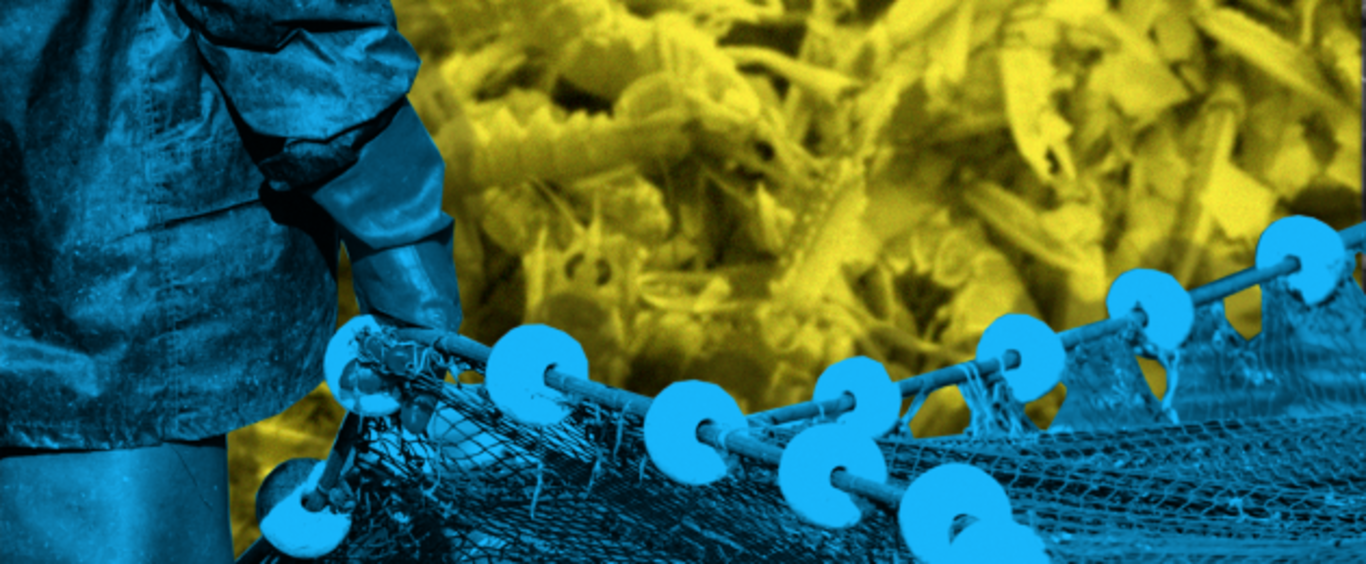'We had to eat leftover meat and fish': Modern slavery in the Irish fishing industry
Migrant fishers who left vessels due to exploitative treatment ‘ignored’ in recent cross-departmental review.
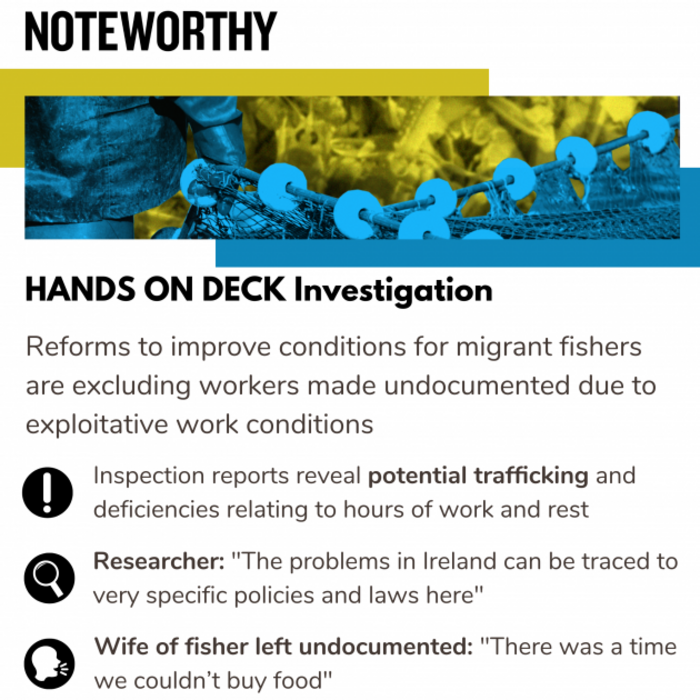
—
“PAPA RINGING.” THE words flash on Matilda’s* phone.
Inside their home built of hollow blocks, in between rice fields in a province just north of Manila – the capital of the Philippines, she calls her husband, Rene*, a fisherman turned carer in Ireland. They haven’t seen each other in five years.
“My sons and I are used to not seeing him. Because of video calls at least we feel he’s here, even though he is not.”
Rene hasn’t been home for several years, due to the exploitative working conditions he faced in Ireland which left him undocumented. His working permission elapsed once he “ran away from the boat”.
It wasn’t his first time working abroad. Rene has travelled across the Pacific Ocean working in different roles on boats since the 1990s. His experience in Ireland was very different.
“I was sleeping in the boat the whole time, even [though] my contract said that my employer should be providing a flat. They didn’t even give us an allowance for food. We had to eat leftover meat and fish on the boat.
“Sometimes, we’d even ask other boats for food, and our rest time was only when there were storms.”
 “Parang nandyan, pero wala.” [Like being there, but not] - Matilda* chats to husband Rene* in her home
“Parang nandyan, pero wala.” [Like being there, but not] - Matilda* chats to husband Rene* in her home
Noteworthy interviewed a number of migrant fishers in Rene’s position; who left vessels due to working conditions they found exploitative. In some cases the vessel owners were subsequently ordered to pay thousands in monies owed.
Yet this process can take years with many finding themselves undocumented during it, often resorting to fighting in the courts to make their status legal once more.
Modern slavery – which includes human trafficking and forced labour – is the illegal exploitation of people for personal or commercial gain. The International Labour Organisation (ILO) states that “a string of recent reports indicate that forced labour and human trafficking in the fisheries sector are a severe problem”.
This string of reports includes a number finding exploitation and trafficking within the Irish fishing sector by the MRCI in 2017, research from Maynooth University and successive annual Trafficking in Persons (TIP) reports from the United States government.
Over the past six months, Noteworthy teamed up with journalists in the Philippines and Ireland to investigate modern slavery in the Irish fishing industry, with a focus on Filipino workers – the biggest group of fishers from from outside the European Economic Area (EEA) in the sector.
By combing through almost 100 inspection reports and numerous other documents obtained through freedom of information (FOI) requests, press requests to government departments and agencies, as well as speaking to fishers, advocates and those working in the fishing industry, we can now reveal:
- Proposed changes for government to improve conditions for migrant workers are excluding those who have become undocumented
- WRC inspectors investigating vessels with non-EEA workers detected almost 400 contraventions of employment legislation since 2016, of which at least 60 occurred since 2021
- Fishers working legally as part of the fishers working scheme for over four years were not able to obtain legal residence like their undocumented colleagues in this year’s regularisation scheme
- Inspection reports reveal potential trafficking and deficiencies relating to hours of work and rest
This investigation was supported by Journalismfund.eu’s Modern Slavery Unveiled grant programme. Yesterday, we investigated trafficking in the fishing industry and reported how the Irish justice system is ‘failing’ migrant fishers who report exploitation.
—
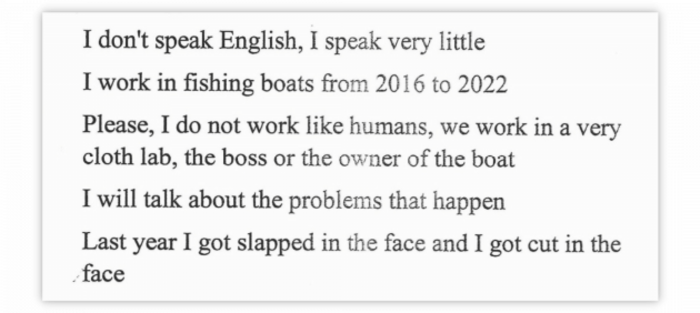
‘The worst’ in Ireland
NGOs and migrant advocates told our investigative team that migrant fishers are becoming undocumented due to the conditions attached to a specific visa – the Atypical Working Scheme (AWS) for non-EEA crew in the Irish fishing fleet.
Bill Abom, deputy director of the Migrant Rights Centre Ireland (MRCI), said that employment permits are problematic but this scheme is “the worst version of the employment permit system” when it comes to people’s rights and the risk of exploitation.
This sentiment was echoed by every expert advocating for migrant fishers that Noteworthy spoke to across the NGO, trade union, academic and justice sectors.
At least 4% of non-EEA fishers in this controversial scheme have been formally recognised as victims of trafficking, with more fighting for unpaid wages through the Workplace Relations Commission (WRC) and Labour Court.
This Atypical Scheme was introduced following an investigation by The Guardian in 2015 which exposed how trafficked migrant workers were being abused in the Irish fishing industry. At the time, almost all non-Europeans working in the sector were undocumented, according to Michael O’Brien, fisheries campaign lead at the International Transport Workers’ Federation (ITF).
The scheme applies to specific fishing boats over 15 metres in length. This currently accounts for just over 170 vessels – 9% of the Irish fishing fleet, but may reduce to under 130 in the near future as many are poised to take part in the Brexit voluntary decommissioning scheme.
Of the 337 holders of valid AWS permissions at the end of last year, the majority (48%) were from the Philippines. Fishers from Ghana, Indonesia and Egypt are also commonly employed on Irish vessels.
In 2016, the scheme was to provide a legal framework for vessel owners to regularise undocumented workers and provide “a legal path to recruit new people thereafter,” O’Brien explained.
Yet, experts state it has now become a vehicle to exploit the same workers it was introduced to protect.
Problems due to ‘specific policies and laws’
MRCI’s Abom said “there is no doubt from our side – whether they [the government] will openly admit it or not – that clear mistakes were made in the design and implementation of the Atypical Working Scheme. And it created significant problems for fishers, many of whom became undocumented as a result.”
Five years ago – shortly after the commencement of the scheme – the MRCI published a report that was highly critical of the scheme following interviews with 30 migrant fishers. It found that over 80% were working more than 60 hours per week, with average hourly wages of just €2.82.
It is evident that little has changed in the subsequent years with similar findings reported in the Maynooth study last year – research funded by the ITF.
Lead researcher of this study Dr Clíodhna Murphy, associate professor of law in Maynooth University, said that “labour exploitation and poor working conditions are rife in the fishing industry”.
“Migrant workers are used and exploited within the fishing industry all over the world. This is a worldwide problem but the problems in Ireland can be traced to very specific policies and laws here.”
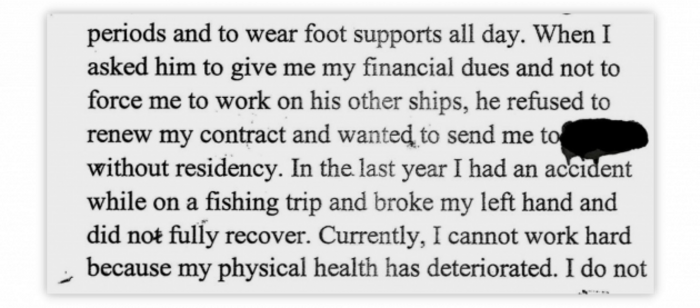
According to O’Brien the experience since the scheme’s introduction “has been a large element of non-compliance”.
For fishers “enrolled in the scheme and recruited in the subsequent years”, almost all that O’Brien has encountered were “not paid as per the requirement of their contract… or they are paid the absolute minimum”. This, he said, often results in “a significant underpayment” compared to hours worked.
Patrick Murphy, chief executive officer at Irish South and West Fish Producers Organisation (IS&WPO), which represents vessel owners, said that the government knew there was a problem with the Atypical Scheme for years and it was “causing chaos in the industry”.
“They [the government] have as much of a responsibility for anything going on with these fellas as anybody else because they knew it was a problem. The scheme was not fit for purpose and instead of fixing the scheme, they let it drag on.”
In regards to the alleged exploitation by vessel owners, he said: “In every single occupation, nobody’s perfect and there are other fellas mistreating fellas. We don’t stand by those people.
“If you treat these lads badly and they leave, you’re out of business. You can’t take your boat out without a full complement of crew.”
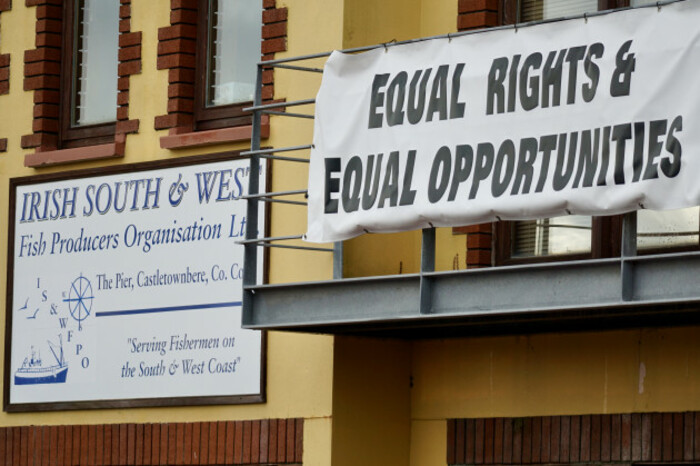 The Atypical Scheme was "causing chaos in the industry", according to Patrick Murphy of the IS&WFPO
The Atypical Scheme was "causing chaos in the industry", according to Patrick Murphy of the IS&WFPO
This scheme was set up to be different from the general working permit which can be issued for two years and then renewed for three years. In contrast, the AWS fisher permissions have to be renewed annually.
Crucially, after five years with a general working permit, workers can apply for a ‘Stamp 4’ visa. This is shortened to two years for those with a critical skills permit. Stamp 4s allow people to work or set up their own business without being tied to a specific employer. Holders can also apply for their families to join them here in Ireland.
Fishers with AWS permissions do not have this entitlement, though a number of cases are being brought to the High Court in the coming weeks contesting this.
It also has very specific stipulations that tie fishers to employers and set contracts, working hours and pay. Both NGOs and vessel owner representatives told Noteworthy these contracts have led to lower pay compared to other crew members who are generally paid with a share of the catch.
The ITF and MRCI are looking for fishers to have a similar permission to the critical skills permit, where they would get a two-year permission, followed by the opportunity to obtain a Stamp 4.
The IS&WPO want a three-year initial period, with a stipulation that if fishers want to leave their employer, the new vessel owner must compensate the previous employer for any costs incurred in recruitment or transport.
‘If you don’t like it, go the f*** home’
The fact that AWS permissions tie fishers to one employer is one of its major underlying problems according to MRCI’s Abom. Though there is an option to move, all of those involved in this sector have highlighted the difficulties involved in moving, with around 15% of fishers doing this since the scheme’s inception.
“You can’t challenge an employer when you’re tied to them and you have no other choice,” he said, adding that he’d be a rich man if he had a euro for every time a worker came back to him and said: “We complained but they [the employer] said – ‘If you don’t like it, go the f*** home’”.
Workplace Relations Commission (WRC) findings back up Abom’s assertion about these employers – over 75% of vessel owners who employ non-EEA workers have been issued with contravention notices since the scheme’s launch near the start of 2016. These included working without permission, issues with hours or work and rest and not providing wages due or leave entitlements.
Now, following pressure from the recent national and international reports, a review of the Atypical Scheme – completed in March but published last month – recommended that the scheme be replaced by a general working permit. It also calls for those currently availing of the scheme to be allowed apply for a Stamp 4 permission after two years or shorter.
Both the ITF and MRCI told Noteworthy that all current AWS permission holders should have immediate access to a Stamp 4 visa. “We’re not talking about huge numbers here,” Abom said.
Murphy of the IS&WPO said that “to solve this problem”, anybody here for over five years has “to be given a Stamp 4 straight away. No question. They’ve earned it.” He added that “anybody that is in the country that’s not working, or whatever, should be allowed to go home and sent home to their families”.
Following the review, the Department of Justice announced on their immigration website that the permission system for fishers would “close for new online applications” at the end of the year to “provide for the transition from the AWS system to the Employment Permit system”.
This news has been welcomed by migrant representatives and vessel owners alike though all advocates and representatives told Noteworthy it is crucial that the details of any changes are agreed with their involvement.
Problem solved? Not for Rene who has been left undocumented because of his treatment within the scheme. The cross-departmental review doesn’t make any recommendations in relation to undocumented workers. And he is not alone.
‘We couldn’t buy food’
Rene, who is in his 50s, worked long hours at sea, with little rest – sometimes at sea, sleeping for just one to two hours each night. Crucially for him and his family, he wasn’t paid for three months after he started his job.
“We had no salary. That is very hard. We didn’t even get any money to spend for us or to send back home. My wife was really angry about that.”
 Matilda barely had enough money to feed her family because of what happened to Rene in Ireland
Matilda barely had enough money to feed her family because of what happened to Rene in Ireland
Back in the Philippines, Matilda’s call is answered by Rene. He tells his family he is doing fine “taking care of an older lady”.
He says he is trying to get permission to be allowed to work but his papers haven’t been settled yet. Until then, he has been shifting from different jobs including a painter, dishwasher, gardener and construction worker, just to survive.
“There was a time we couldn’t buy food, we couldn’t buy rice because there was really nothing coming from him. We had a hard time eating three times a day,” Matilda said.
Both their sons, one in senior high school and one in his last year in college, had to stop studying for two years because of their situation. The eldest took a porter job which paid Php 250 (€4.20) per day.
“Sometimes he [Rene] would send us Php 1,700 (€29) to Php 3,000 (€51) a month just so we could survive,” Matilda recalled.
Their financial situation got so bad that at one point four moneylenders would come to their house “almost every day”. Matilda would tell them that she didn’t know when she would receive money from Rene.
His youngest son said: “I was so stressed because of what happened to my father, to the point that my hair was falling out. I had to accept that I will be delayed in my studies because there was no choice for me.”
 Matilda shows the investigative team cash deposits made to the lending company
Matilda shows the investigative team cash deposits made to the lending company
Inequity in the system
“My experience of undocumented [fishers] is of people who got sick with serious illnesses, ended up in hospital and were abandoned by their employers,” Sr Jo McCarthy who set up the Cork Migrant Centre told Noteworthy. She is highly critical of the Atypical Scheme, calling it a “form of indentured slavery”.
She also told our team about the inequality experienced by fishers currently enrolled in the scheme or undocumented because of it. Two Egyptians she worked with – one undocumented and one employed through the AWS scheme for over five years – have had very different experiences.
The undocumented fisher “has applied and got his Stamp 4 because he was here for four years,” she explained. This was part of the scheme by the government earlier this year to regularise long-term undocumented workers.
Yet his colleague – who worked in Ireland for over five years with permissions under the AWS scheme – “has got a deportation order” because of a gap in his work permit. Like Rene, the review of the scheme does not help this fisher.
When Noteworthy asked the Department of Justice what it was doing to help fishers who became undocumented due to flaws in the AWS scheme, a spokesperson said:
Undocumented workers remain outside of the recommendations of this report. However, it is open to any person who is undocumented in the State to apply to the Minister to regularise their residence.
It is unclear how many undocumented fishers that previously had AWS fisher permissions are currently working on Irish vessels, but WRC inspection reports from 2021 and 2022 – obtained by the investigative team through FOI request – reveal that 40% of cases involved undocumented workers.
At least three of these 10 cases involved fishers who had an AWS permission which had expired, with four cases of alleged trafficking also found. One report stated: “During that inspection it became apparent that a fisher engaged on that vessel, a Ghanaian national… had no documentation on board and that his passport was being held by the leasing company.”
The WRC has “no function or responsibility in relation to the investigation and prosecution of human trafficking”, according to a spokesperson for the Department of Enterprise, Trade and Employment (DETE) that oversees the WRC.
These cases were referred by the WRC to the gardaí, according to the inspection reports. We reported yesterday that there have been no prosecutions by the Director of Public Prosecutions (DPP) to date in relation to trafficking in the fishing industry.
Just three of the 10 vessel owners were successfully prosecuted by the WRC for employing these undocumented fishers, with three unsuccessful prosecutions also reported. The prosecutions resulted in convictions for vessel owners and fines ranging from €1,000 to €3,000.
‘More persistence needed’
O’Brien from the ITF said that “the non-compliances with the WRC are not the full story”. He said that if a migrant worker raises issues, they risk not only losing their job but also their legal status “as he is left to try and find another vessel owner to hire him under the terms of the scheme”.
MRCI’s Abom said that “workers have to know that if they do make a complaint that there’s somewhere else for them to go to continue their income.” He added that “if they don’t have a pathway or they don’t know what they can do, they’re not going to speak up.”
A review of the WRC’s outreach and use of interpretation for the fisheries sector published in February 2022 stated that, out of 25 non-EEA fishers contacted by the WRC for interviews in November 2021, just two responses were received.
We obtained a similar finding in our analysis of 2021 and 2022 WRC inspection reports, as when inspectors attempted to follow-up with non-EEA fishers for a “confidential interview” or information, no response was received in at least two thirds of the cases.
In one case, when an AWS permission holder was interviewed during an unannounced inspection, he said that “he was not paid for all hours worked” and “did not receive holiday pay or public holiday entitlements”.
The report continued: “However, he requested that his name was not mentioned to the employer and did not want to raise any grievances or make any complaints.” The inspector gave his business card to the migrant fisher but wrote that none of the AWS permission holders were in contact.
O’Brien said that the inspectors “don’t routinely use interpreters during the course of the day” and that they “need to be a bit more persistent”.
Interpretation was mentioned in one of the reports we obtained when the inspector wrote that interpretation for an interview in April 2021 was provided by the worker’s friend.
When the ITF’s criticism of interpreter services was put to the Department of Enterprise, Trade and Employment (DETE), a spokesperson said that the WRC “does avail of interpretation services, where appropriate”.
“Interpretation, translation services and interactive technologies are available to the WRC and are deployed by inspectors as required. The WRC takes every reasonable step to contact employees for investigation purposes.”
The DETE spokesperson stated that measures and initiatives from their review earlier this year were currently being progressed.
On a related note, for the cross-departmental review of the AWS fishers, it stated: “Google translate was used to get a basis of understanding of the content of the foreign language submissions”.
Extracts from a number of these submissions are included throughout this article. These were obtained through an FOI request to the Department of Justice.
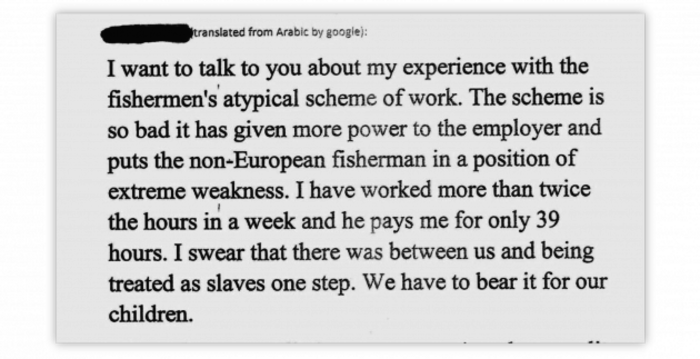
Working hours not logged
A large proportion of WRC cases we analysed were in relation to the granting of annual leave and public holiday entitlements, as well as unpaid wages, unlawful deductions and issues with payslips and statements of wages.
Just over €15,500 was paid to migrant fishers across nine WRC cases where money was owed.
These were among the almost 530 inspections of the 174 vessels in the scheme since its inception, according to a Department spokesperson. Since 2016, the WRC have “brought 22 prosecutions against fishing vessel owners,” they added.
Nathan*, who came to Ireland from the Philippines last year, experienced many of these issues before leaving his employer’s vessel in the past few months due to conditions he felt he could no longer endure.
On board he had “almost no sleep” which impacted his eyes, he said while pointing to a red mark near his iris. Crew members from Eastern Europe – whom, he said, were paid more than €5,000 per trip – were also “intimidating Filipinos”, he claimed.
In terms of his pay, his salary was “not even minimum wage”, he said, and that his working hours were not logged properly.
He had travelled to Ireland as his friends – who worked on different vessels – had a good experience on the Atypical Scheme, receiving bonuses. He thought this opportunity would enable him to finish building his house, which he said is still not finished.
He felt that fishers who are speaking up about these issues will hopefully improve conditions for other workers. Already, he has been told by friends that following a WRC inspection of their vessel their salary went from €450 to €500 per week.
Legislation blocking compensation
The WRC cannot recoup monies owed to fishers in relation to excessive hours worked or insufficient rest, including working through weekends and holidays. Instead, the only recourse is prosecution by the Marine Survey Office (MSI), which does not lead to any compensation for the migrant fishers.
There have been a number of WRC cases brought by AWS fishers in recent years, with thousands in compensation awarded. However, some of this has since been lost on appeal because of this issue.
- In our final article of this series – out on Sunday – we examine cases brought by migrant workers against vessel owners and delve into the consequences of the lack of WRC jurisdiction over breaches in rest periods.
Rectifying this was part of a mediation agreement with the International Transport Workers’ Federation (ITF) in 2019, with Minister Damien English stating in a recent response to a parliamentary question that it “will be progressed as soon as is practicable in new legislation as part of a package we are working on”.
O’Brien said that “vessel owners – as employers – have to be held responsible for forcing them [migrant fishers] to work excessive hours and, consequently, having insufficient rest.”
Once fixed, this, alongside changes in the working permit, “may combine to force upward pressure to impose better conditions for fishers”, O’Brien explained.
‘No hours of rest records available’
Similar deficiencies to that found by the WRC were replicated in Marine Survey Office (MSO) unscheduled inspection reports from 2021 onwards – obtained by Noteworthy through an FOI request. These included vessels across the entire fishing fleet – not just vessels eligible to employ AWS holders.
A total of 45% of these inspections found deficiencies relating to hours of work or rest. One inspector of a vessel at Dingle, Co Kerry wrote: “The Master and 4x crew onboard cannot produce copies of records of rest / work.” Copies of the crew members’ work agreements could also not be produced.
Another vessel – with 27 deficiencies – had “no crew list on board” and “no hours of rest records available for any crew member”.
According to O’Brien, “the most serious responsibility” of the MSO on fishing vessels with non-EEA migrant labour “is the question of hours of work and hours of rest” – all the more, given these breaches can’t currently be brought to the WRC.
The 42 MSO inspection reports obtained by the investigation team detailed 350 deficiencies – ranging from one to 35 per report – but just four vessel inspections had “grounds for detention”. In the vast majority of cases, the master was “instructed to rectify” the deficiency “before departure” or “within 14 days”.
“The MSO has an effective enforcement regime and any deficiencies identified are given a corrective action and the owner and skippers of vessels are required to rectify deficiencies,” said a spokesperson for the Department of Transport – which oversees the MSO.
Undocumented fishers left struggling
“For an inherently hazardous sector”, O’Brien asked if a lack of public outcry given this volume of health and safety breaches, is because of the high intensity of migrants working in it. “Would it be tolerated in any other sector? We have to ask the question of ourselves as a society.”
Those left undocumented in Ireland by the current system told our team that though unions like SIPTU and the ITF were of help, they were often left struggling, with families badly impacted back home.
Mark*, a seafarer from the south of the Philippines, has been working in the sea since the mid-2000s. His father was also a fisherman and Mark travelled with him from a young age to help on the boat.
He told our team that he left the vessel after a number of months due improper wages for long working hours – of around 70-80 hours per week – which were often double the 39-hours in his contract. “European crews are paid better and get a share,” he explained.
Now undocumented, he is currently trying to obtain permission to be able to work legally in Ireland once more.
When we visited his family home, his wife Lucy* said that “sometimes what he sends is really not enough for us to survive, but what’s important is we’re able to buy rice at least… it’s still better than nothing”.
“His youngest daughter misses him so much. He left when she was just two – she’s now six… He’s been gone too long”, she said.
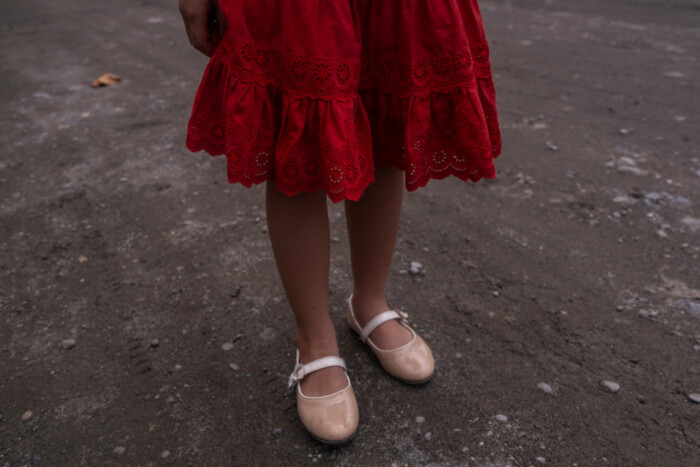 Mark has not seen his in person daughter (above) for a number of years
Mark has not seen his in person daughter (above) for a number of years
Mark’s work on the boat in Ireland often began at midnight. “It’s a lot of work fishing for prawns, we get around 4 hours of sleep each day, but that’s only if there isn’t trouble with the nets,” he said.
In Maynooth’s study, a number of workers “described being asked to hide fish, in contravention of quota rules”. Mark and another migrant fisher who spoke to our investigative team described similar practices.
“There is even overfishing, we catch black sole but they hide it,” Mark said, and added that these fish were not added to the catch logbook.
“There are no jobs here, that’s why Mark went abroad,” his mother Cynthia* told our team. “We are always in touch with him. Every day he says that his life is hard, that he has to [move] from one job or another because his papers are not yet fixed.”
Nobody knows about Mark’s present situation. When neighbours ask why they borrow money, his family lies and says there was a delay in his pay.
Lucy, his wife added: “When he left, we were expecting that life would be easier, that he would be able to send his kids to school, but what happened was the opposite.
“At least we’re able to get by still. It’s just harder now because the kids are growing already, so that means the costs for raising them is higher as well.”
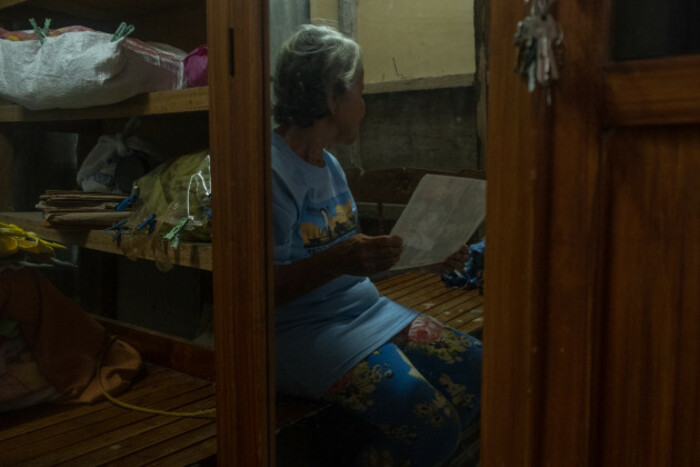 Cynthia, Mark’s mother, looks at a photo of her son at their home
Cynthia, Mark’s mother, looks at a photo of her son at their home
According to Dr Maruja Asis, Director of Research and Publications at the Scalabrini Migration Center in Manila, Filipino migrants leave the country for economic reasons.
“They want to improve their family’s lives, they dream for the welfare of the families. Of course, there are Filipinos who wish to see the world, but the biggest motivation is economic.”
Fr Paulo Prigol, Manila Port Chaplain of the international maritime charity Stella Maris said that migrant fishermen are a forgotten category of overseas workers in the Philippines. The sector has been very underreported and understudied.
Currently, there is a proposed Magna Carta for seafarers in the Senate, which hopes to advance their rights on the basis of the International Labour Organization’s Maritime Labour Convention (ILO-MLC) of 2006.
In addition, Fr Prigol said that “the government should craft a law specifically for migrant fishers, because usually when fishers are repatriated they just go home, and go abroad once another opportunity arises. But how best can we help them if fishers’ only choice is to leave home?” he said.
We asked the Department of Migrant Workers in the Philippines – who are “tasked to protect the rights and promote the welfare of overseas Filipino workers” – what it is doing to help people who are being exploited and prevent these practices, as well as a number of other questions. We did not receive a response in time for publication.
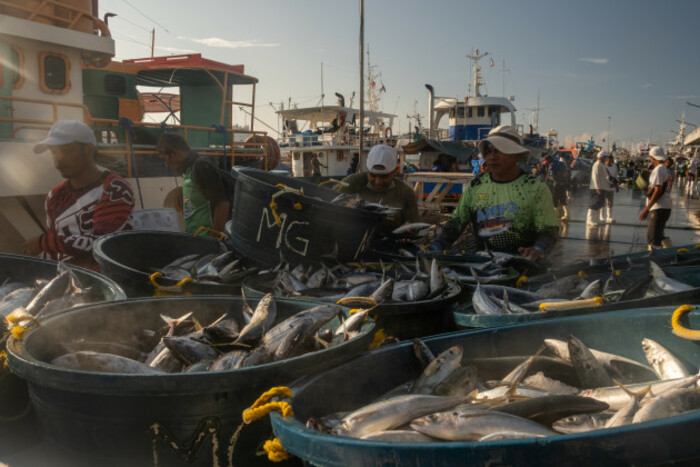 Workers in General Santos fishing port where a number of Filipino fishers travel from to work in Ireland
Workers in General Santos fishing port where a number of Filipino fishers travel from to work in Ireland
‘Who is responsible?’
Back in Ireland, though change is afoot following the review of the scheme, both NGOs, unions and vessel owner representatives are hesitant to celebrate just yet.
This is not the first time that recommendations were made in regards to the Atypical Workers Scheme. In addition to the MRCI, Maynooth and US-Trafficking in Persons reports, the Joint Oireachtas Committee on Enterprise, Trade and Employment made 12 recommendations about the scheme in 2017.
One recommendation was that the scheme be amended to be linked to the worker only, and not specific to a vessel or owner – an issue with the current scheme that every advocate that we spoke to said leaves fishers at high risk of exploitation and forced labour.
It also recommended that “a single Minister/Government Department be given overall responsibility for the fishing industry”.
There are currently four departments – Justice; Enterprise, Trade and Employment; Agriculture, Food and the Marine as well as Transport involved. In addition, the navy, WRC and MSO undertake inspections, with other agencies including BIM and the Sea Fisheries Protection Authority involved.
This is key, according to Patrick Murphy of the IS&WPO who said there is currently “collective responsibility” which he said has been “frustrating” when trying to get answers from various departments. “Who is responsible? Who is the one where the buck stops?”
The AWS review group stated that it “understands that none of the recommendations of the Committee were acted upon at the time or subsequently”.
And that is the worry.
For MRCI’s Bill Abom, their “concern now and going forward is to try to fix the past”. He said “the best way to do that is to give workers immediate access to apply for a Stamp 4” – including both those who still have valid AWS permissions and fishers who are now undocumented.
Now, they’re ignoring the undocumented fishers completely – and there’s a good pool of them… so there needs to be a solution there.
That includes Rene, Nathan and Mark as well as the impact it is having on their parents, wives and children.
Being undocumented, Rene worries about whether he will ever get a break from work and afford to retire.
Currently, his work as a carer is stable enough to send his children back to school. Yet, he fears future instability. This concern was echoed by his eldest son when we visited their family home near Manila.
“If the person he’s caring for dies, then what would happen to us?”
*Names have been changed
—

EXPLOITATION IN THE FISHING INDUSTRY
As part of this investigation, our team examines how the Irish justice system is ‘failing’ migrant fishers who report exploitation. We also analyse the findings of navy inspections at sea, with a number of fishing vessels almost fully crewed by migrant workers.
Have a listen to The Explainer x Noteworthy podcast on the investigation’s findings.
A version of this article was also published by Philstar in the Philippines.
FULL SERIES IS OUT NOW
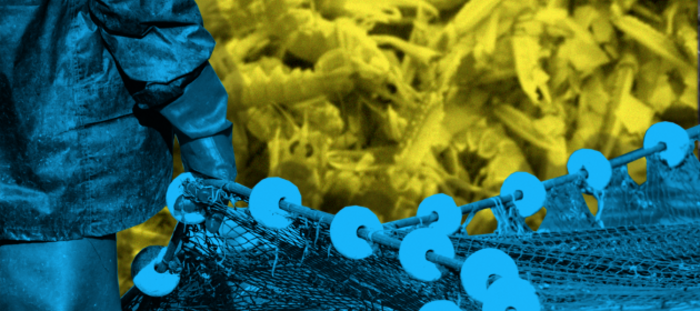
By Maria Delaney of Noteworthy and Geela Garcia
Reporter Louise Lawless was also part of our cross-border team. The investigation was supported by Journalismfund.eu’s Modern Slavery Unveiled grant programme.
Please support our work by submitting an idea, helping to fund a project or setting up a monthly contribution to our investigative fund HERE>>

